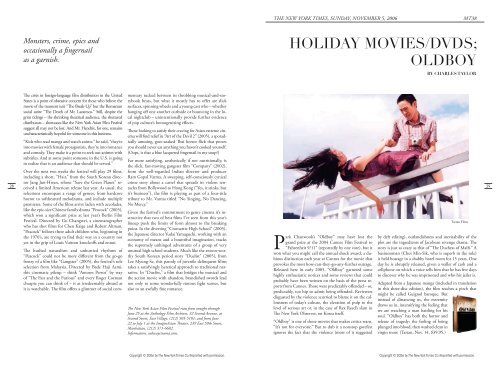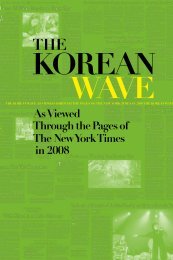The Korean Wave 2006 - Korean Cultural Service
The Korean Wave 2006 - Korean Cultural Service
The Korean Wave 2006 - Korean Cultural Service
You also want an ePaper? Increase the reach of your titles
YUMPU automatically turns print PDFs into web optimized ePapers that Google loves.
<strong>The</strong> New York Times, Sunday, november 5, <strong>2006</strong><br />
mt38<br />
Monsters, crime, epics and<br />
occasionally a fingernail<br />
as a garnish.<br />
Holiday Movies/Dvds;<br />
Oldboy<br />
By CHARLES TAYLOR<br />
28<br />
<strong>The</strong> crisis in foreign-language film distribution in the United<br />
States is a point of obsessive concern for those who believe the<br />
movie of the moment isn’t “<strong>The</strong> Break-Up” but the Romanian<br />
social satire “<strong>The</strong> Death of Mr. Lazarescu.” Still, despite the<br />
grim tidings – the shrinking theatrical audience, the shuttered<br />
distributors – showcases like the New York Asian Film Festival<br />
suggest all may not be lost. And Mr. Hendrix, for one, remains<br />
uncharacteristically hopeful for someone in this business.<br />
“Kids who read manga and watch anime,” he said, “they’re<br />
into movies with female protagonists, they’re into romance<br />
and comedy. <strong>The</strong>y make it a point to seek out animes with<br />
subtitles. And at some point someone in the U.S. is going<br />
to realize that is an audience that should be served.”<br />
Over the next two weeks the festival will play 29 films,<br />
including a short, “Hair,” from the South <strong>Korean</strong> director<br />
Jang Jun-Hwan, whose “Save the Green Planet” received<br />
a limited American release last year. As usual, the<br />
selections encompass a range of genres, from hardcore<br />
horror to softhearted melodrama, and include multiple<br />
premieres. Some of the films arrive laden with accolades,<br />
like the epic-size Chinese family drama “Peacock” (2005),<br />
which won a significant prize at last year’s Berlin Film<br />
Festival. Directed by Gu Changwei, a cinematographer<br />
who has shot films for Chen Kaige and Robert Altman,<br />
“Peacock” follows three adult children who, beginning in<br />
the 1970’s, are trying to find their way in a country not<br />
yet in the grip of Louis Vuitton knockoffs and ennui.<br />
<strong>The</strong> hushed naturalism and unhurried rhythms of<br />
“Peacock” could not be more different from the go-go<br />
frenzy of a film like “Gangster” (2005), the festival’s sole<br />
selection from Malaysia. Directed by Bade Haji Azmi,<br />
this cinematic pileup – think “Amores Perros” by way<br />
of “<strong>The</strong> Fast and the Furious” and every Roger Corman<br />
cheapie you can think of – is as irredeemably absurd as<br />
it is watchable. <strong>The</strong> film offers a glimmer of social commentary<br />
tucked between its throbbing musical-and-storybook<br />
beats, but what it mostly has to offer are slick<br />
surfaces, spinning wheels and a young cast who – whether<br />
hanging off one another curbside or bouncing in the local<br />
nightclub – unintentionally provide further evidence<br />
of pop culture’s homogenizing effects.<br />
Those looking to satisfy their craving for Asian extreme cinema<br />
will find relief in “Art of the Devil 2” (2005), a sporadically<br />
amusing, gore-soaked Thai horror flick that proves<br />
you should never eat anything you haven’t cooked yourself.<br />
(Oops, is that a blue lacquered fingernail in my soup?)<br />
Far more satisfying, aesthetically if not nutritionally, is<br />
the slick, fast-moving gangster film “Company” (2002),<br />
from the well-regarded Indian director and producer<br />
Ram Gopal Varma. A sweeping, self-consciously cynical<br />
crime story about a cartel that spreads its violent tentacles<br />
from Bollywood to Hong Kong (“Yes, it stinks, but<br />
it’s business”), the film is playing as part of a four-title<br />
tribute to Mr. Varma titled “No Singing, No Dancing,<br />
No Mercy.”<br />
Given the festival’s commitment to genre cinema it’s instructive<br />
that two of best films I’ve seen from this year’s<br />
lineup push the limits of form almost to the breaking<br />
point. In the diverting “Cromartie High School” (2005),<br />
the Japanese director Yudai Yamaguchi, working with an<br />
economy of means and a bountiful imagination, tracks<br />
the supremely unhinged adventures of a group of very<br />
unusual high school students. Much like the swoon-worthy<br />
South <strong>Korean</strong> period story “Duelist” (2005), from<br />
Lee Myung-Se, this parody of juvenile delinquent films<br />
takes a satisfyingly heretical approach to traditional narrative.<br />
In “Duelist,” a film that bridges the musical and<br />
the action movie with abandon, brandished swords lead<br />
not only to some wonderfully riotous fight scenes, but<br />
also to an awfully fine romance.<br />
<strong>The</strong> New York Asian Film Festival runs from tonight through<br />
June 25 at the Anthology Film Archives, 32 Second Avenue, at<br />
Second Street, East Village, (212) 505-5181; and from June<br />
22 to July 1 at the ImaginAsian <strong>The</strong>ater, 239 East 59th Street,<br />
Manhattan. (212) 371-6682.<br />
Information: subwaycinema.com.<br />
Park Chanwook’s “Oldboy” may have lost the<br />
grand prize at the 2004 Cannes Film Festival to<br />
“Fahrenheit 9/11” (reportedly by one vote), but it<br />
won what you might call the annual shock award, a dubious<br />
distinction each year at Cannes for the movie that<br />
provokes the most how-can-they-go-any-further outrage.<br />
Released here in early 2005, “Oldboy” garnered some<br />
highly enthusiastic notices and some reviews that could<br />
probably have been written on the basis of the press reports<br />
from Cannes. Those were predictably offended – or,<br />
predictably, too hip to admit being offended. Reviewers<br />
disgusted by the violence scurried to blame it on the callousness<br />
of today’s culture, the elevation of pulp to the<br />
level of serious art or, in the case of Rex Reed’s slam in<br />
<strong>The</strong> New York Observer, on Korea itself.<br />
“Oldboy” is one of those movies that makes critics warn,<br />
“It’s not for everyone.” But to dub it a nonstop gorefest<br />
ignores the fact that the violence (most of it suggested<br />
Tartan Films<br />
by deft editing), outlandishness and inevitability of the<br />
plot are the ingredients of Jacobean revenge drama. <strong>The</strong><br />
story is just as crazy as that of “<strong>The</strong> Duchess of Malfi.” A<br />
businessman (Choi Min-Sik, who is superb in the role)<br />
is held hostage in a shabby hotel room for 15 years. One<br />
day he is abruptly released, given a wallet of cash and a<br />
cellphone on which a voice tells him that he has five days<br />
to discover why he was imprisoned and who his jailer is.<br />
Adapted from a Japanese manga (included in translation<br />
in this three-disc edition), the film reaches a pitch that<br />
might be called Guignol baroque. But<br />
instead of distancing us, the extremity<br />
draws us in, intensifying the feeling that<br />
we are watching a man battling for his<br />
soul. “Oldboy” has both the horror and<br />
release of tragedy: the feeling of being<br />
plunged into blood, then washed clean in<br />
virgin snow. (Tartan, Nov. 14, $39.95.)<br />
29<br />
Copyright © <strong>2006</strong> by <strong>The</strong> New York Times Co. Reprinted with permission.<br />
Copyright © <strong>2006</strong> by <strong>The</strong> New York Times Co. Reprinted with permission.





